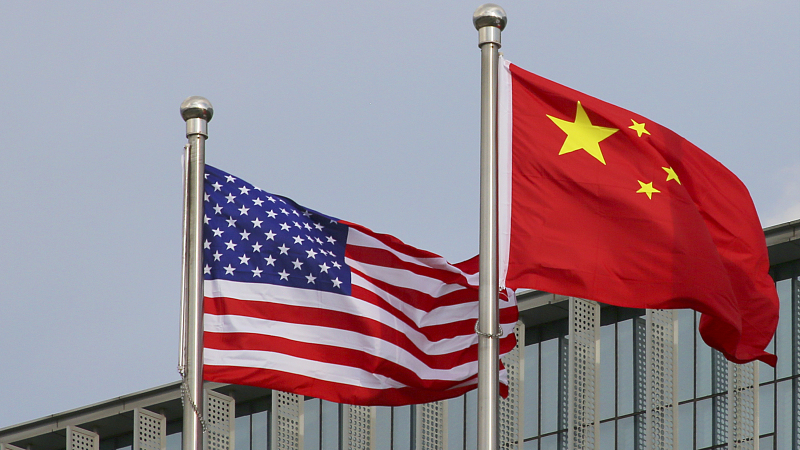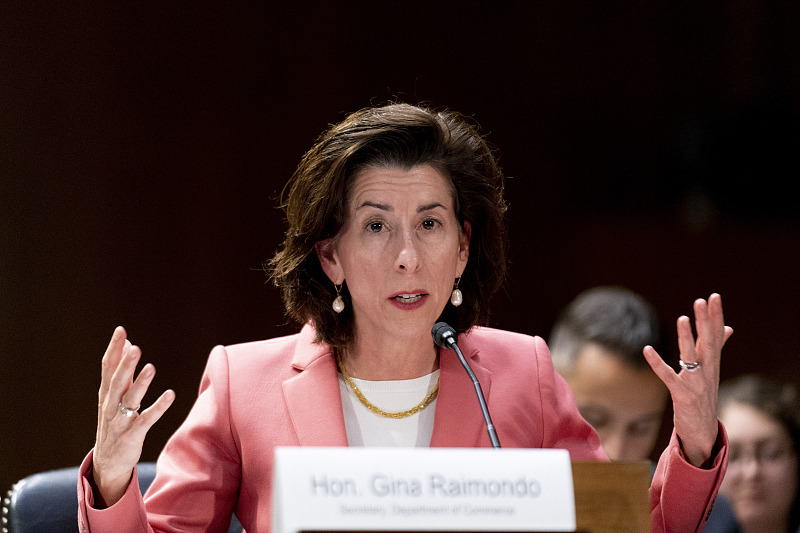
National flags of the U.S. and China. /CFP
National flags of the U.S. and China. /CFP
Editor's note: Liu Chunsheng, a special commentator on current affairs for CGTN, is an associate professor at the Beijing-based Central University of Finance and Economics. The article reflects the author's opinion, and not necessarily the views of CGTN.
Recently, China's Commerce Minister Wang Wentao met with the Secretary of the U.S. Department of Commerce Gina Raimondo in Washington. China expressed key concerns regarding U.S. economic and trade policies towards China, semiconductor policies, export controls and foreign investment reviews. Both sides agreed to establish channels of communication to strengthen exchanges on specific economic and trade concerns and areas of cooperation.
This meeting comes after a Chinese weather balloon accidentally entered U.S. airspace in February and was shot down. This incident left the relationship between the two countries at an impasse.
Considering what the U.S. has done against China, the meeting between the Chinese and American Commerce Ministers showcased the utmost goodwill and sincerity from China.
Just a week ago before this meeting, U.S. Trade Representative Katherine Tai announced that the U.S. and China's Taiwan region, have completed negotiations on the Trade and Investment Framework Agreement between the two sides. The negotiations for the Trade and Investment Framework Agreement of the U.S. and China's Taiwan region were officially launched in August 2022 and an agreement was reached in less than a year.
China has consistently and firmly opposed any form of official exchanges between countries with which it has diplomatic relations and Taiwan, including the signing of any agreements with sovereign implications and official nature. The actions taken by the U.S. seriously violate the one-China principle and the provisions of the three Sino-U.S. Joint Communiques, and they go against the commitment made by the U.S. to maintain unofficial relations with Taiwan. China expresses strong dissatisfaction and resolute opposition to this.
On March 2, 2023, the Bureau of Industry and Security (BIS) added 28 entities and individuals located in China to the Entity List.
In addition, based on Executive Order 13846 by the U.S. Department of State, two Chinese companies and several of their vessels were added to the Specially Designated Nationals and Blocked Persons List (SDN list) for their involvement in significant transactions related to the transportation of petroleum products from Iran.

Secretary of U.S. Department of Commerce Gina Raimondo speaks on Capitol Hill in Washington, May 16, 2023. /CFP
Secretary of U.S. Department of Commerce Gina Raimondo speaks on Capitol Hill in Washington, May 16, 2023. /CFP
Since July 2022, Chinese companies in various sectors, including artificial intelligence, semiconductors, biotechnology, and quantum computing, have been added to the Entity List by the BIS.
In the field of chip manufacturing, there are increasing sanctions on Semiconductor Manufacturing International Corporation (SMIC). As the largest chip manufacturing company in China with the latest technology, the U.S. is planning to take measures to restrict the import of equipment related to the 14nm process by SMIC, and it may further expand to the mature 28nm process. If SMIC cannot obtain shared equipment below the 14nm process, such as etching machines also used for the 40nm process, it will directly affect the expansion of its 40nm process.
In the field of autonomous driving, most Chinese companies involved in artificial intelligence, have been included in the Entity List. It will be more difficult for these Chinese companies to import chips, operating systems, and other components from the U.S.
A stable bilateral relationship requires efforts from both sides, however, the U.S. always says one thing and does another and the agreements reached at the negotiating table were often thrown into the trash.
China, as an important force in stabilizing the global industrial and supply chains, is willing to continue to be a reliable trading partner and mutually beneficial cooperative partner for all countries, and to further expand high-level opening-up to benefit the world with its high-quality development.
Recently, there have been signs of a resumption of high-level exchanges between China and the U.S. However, the substance of China-U.S. relations has not undergone any meaningful changes. The U.S. continues to seek to suppress and contain China, engaging in actions that violate China's bottom line and undermine its interests.
Therefore, if the U.S. truly wishes to improve its relations with China, it should take concrete actions and demonstrate goodwill, rather than pursuing communication for the sake of communication.
(If you want to contribute and have specific expertise, please contact us at opinions@cgtn.com. Follow @thouse_opinions on Twitter to discover the latest commentaries in the CGTN Opinion Section.)